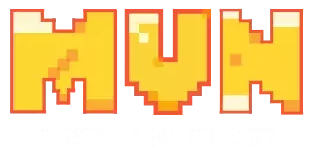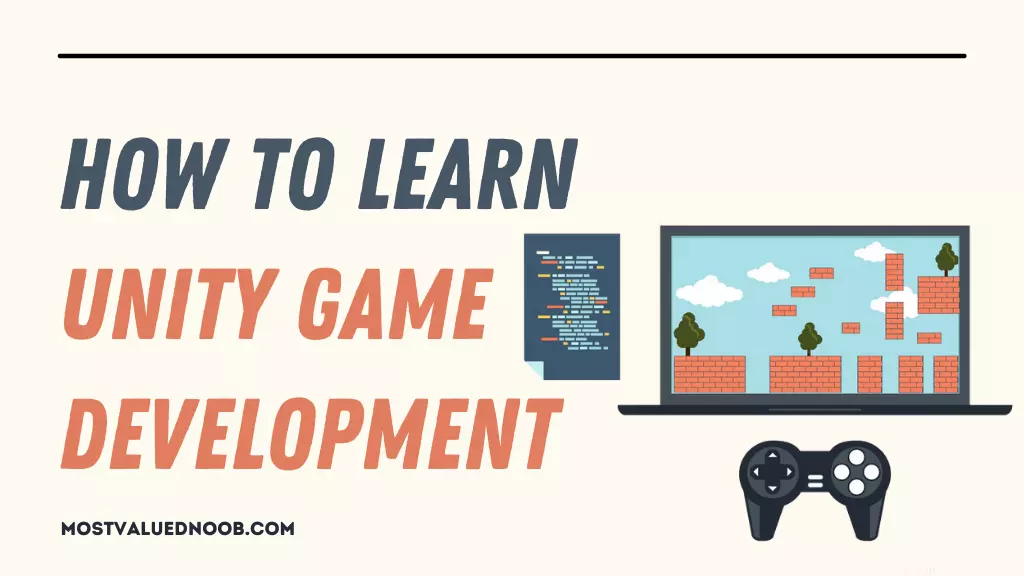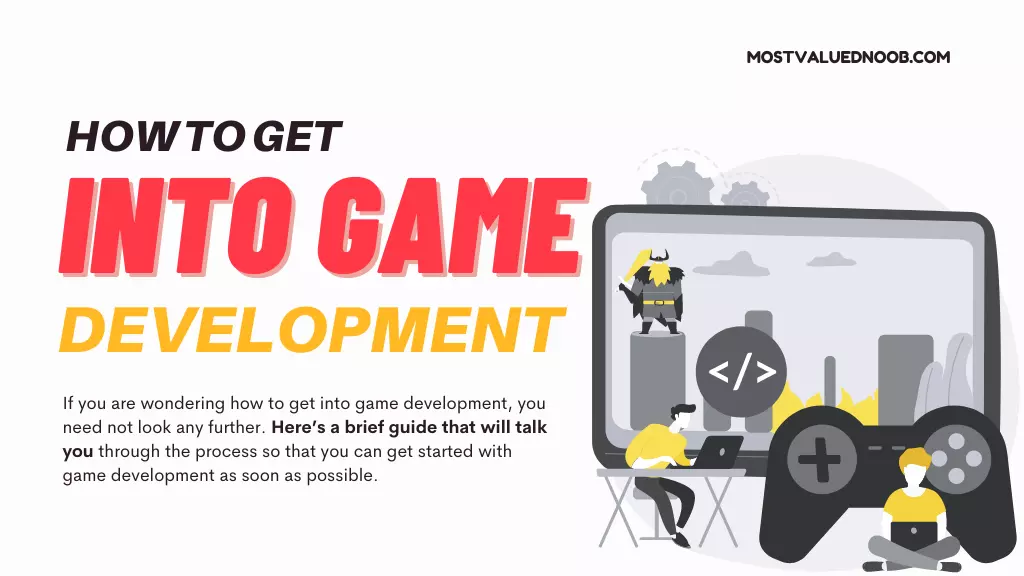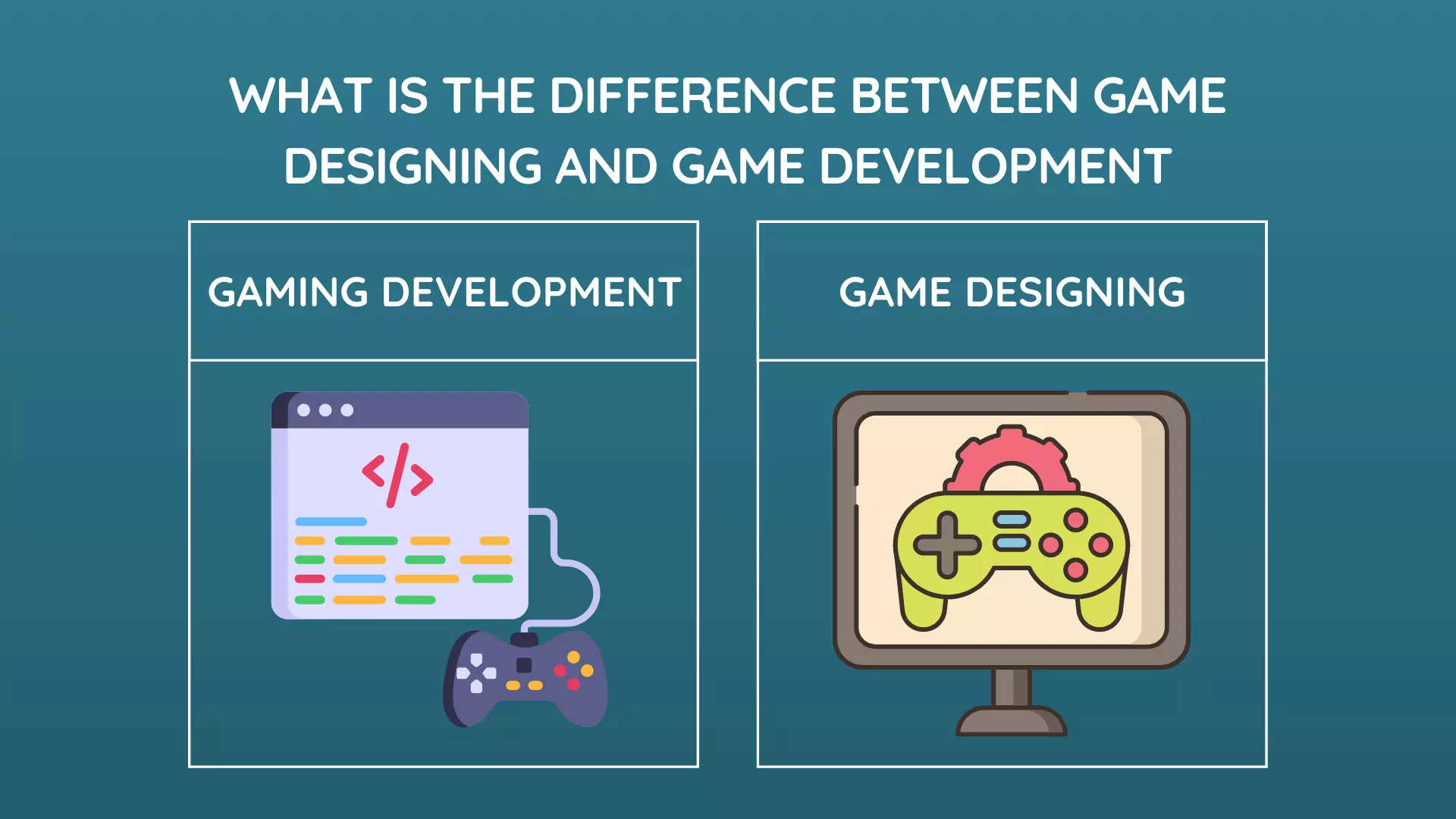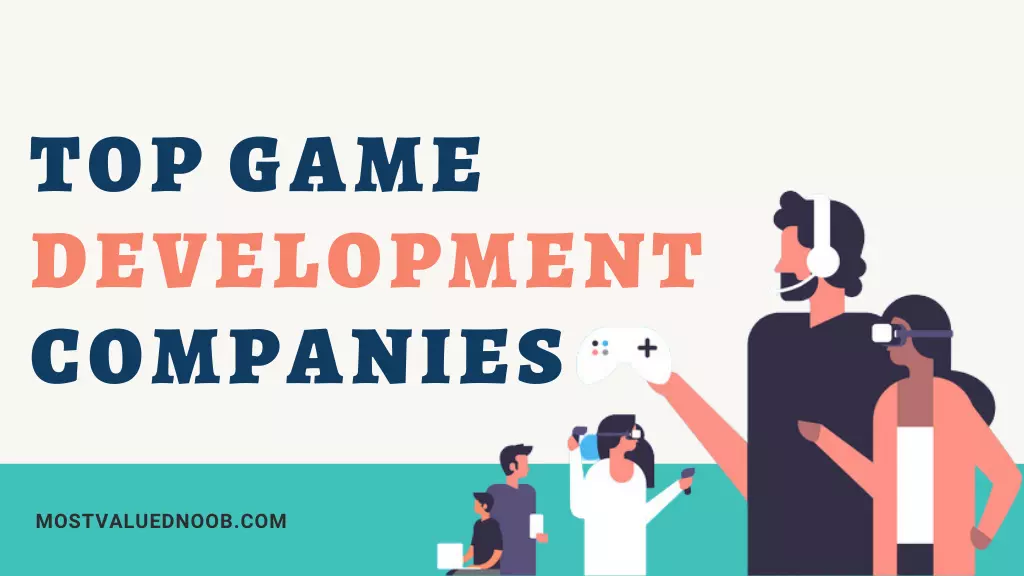Have you ever pondered, when playing a video game, how it was produced and how it managed to break the top games of all time? The aesthetics, the language, the concept, and, most importantly, the game’s design, and not just that, but there’s so much more to a game than what you see on the screen that helps it win the best game’s board. It is crucial to understand and know which is the best language for game development so as to churn out interesting and gripping titles that can be enjoyed by millions and billions of gamers worldwide.
It amuses me how the world moved from practically existing to virtual reality content production and gaming since they didn’t even have phones in the market a few years ago. Now they are implementing virtual reality in real life, which is the most significant market draw, and gaming has a fair chunk of all the adolescents occupied.
As I see it, The future is gaming and VR content. If I were you, I’d build my life around how I can contribute to this rapidly increasing industry, which is why this article was intended to help you understand how to take your first steps into this broad field.
Best Languages used for Game Development:
The first step necessary in understanding how to get into game development is to acquire the correct coding language(s) utilized for game production. What you see on the screen is the result of these languages and their implementation tools working their magic. If you work in the computer sector, you may be familiar with the languages I’m referring to, but if you’re new to the notion and have a strong interest in the subject of this post, don’t worry since this piece of content is specifically focused on using intelligible phrases for both experienced and inexperienced individuals.
(The languages have been prioritized based on the ease of coding rather than the most appropriate language, so proceed accordingly.)
1. Python:
As a python user, I can wholeheartedly suggest python as the most user-friendly programming language accessible from various languages used by programmers. Although this language hasn’t achieved as much popularity, it is the fastest-growing language that gives a wide range of libraries (PyGame, for example) that are specifically developed for user convenience (user-friendliness.)
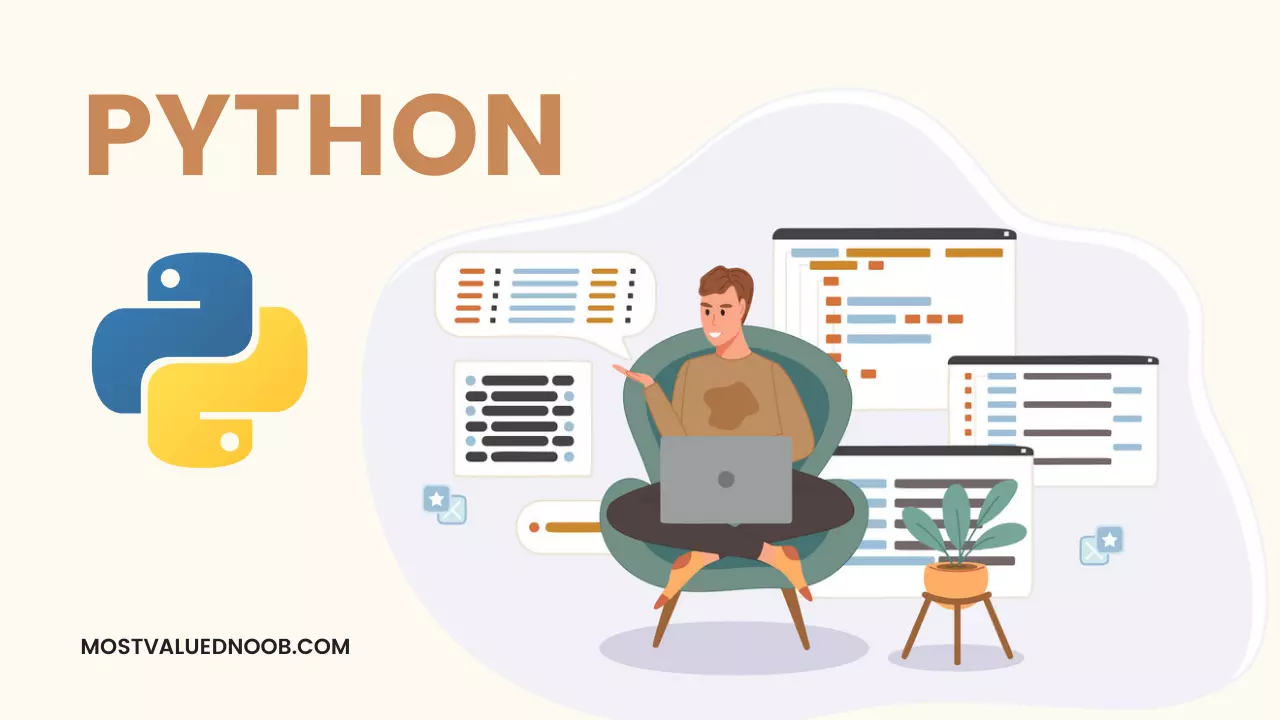
Not only that, but Python features an English-like syntax that makes reading, writing, and understanding the language simpler. Because you may obtain greater functionality with fewer lines of code, this programming language is ideal for prototyping and game creation.
Games built using this language: Bridge Commander, Battlefield 2, The Sims 4, etc.
2. HTML5
This version of HTML is the latest and “..most enhanced version” of HTML. This language is also a potential platform for cross-platform mobile apps, which is used to develop and code many web pages. HTML5 has an edge over other languages in the sense that it allows you to create a cleaner and improved code while making things easier for game creators, and its ultimate gaming engines play a significant influence on its popularity in the game production field.
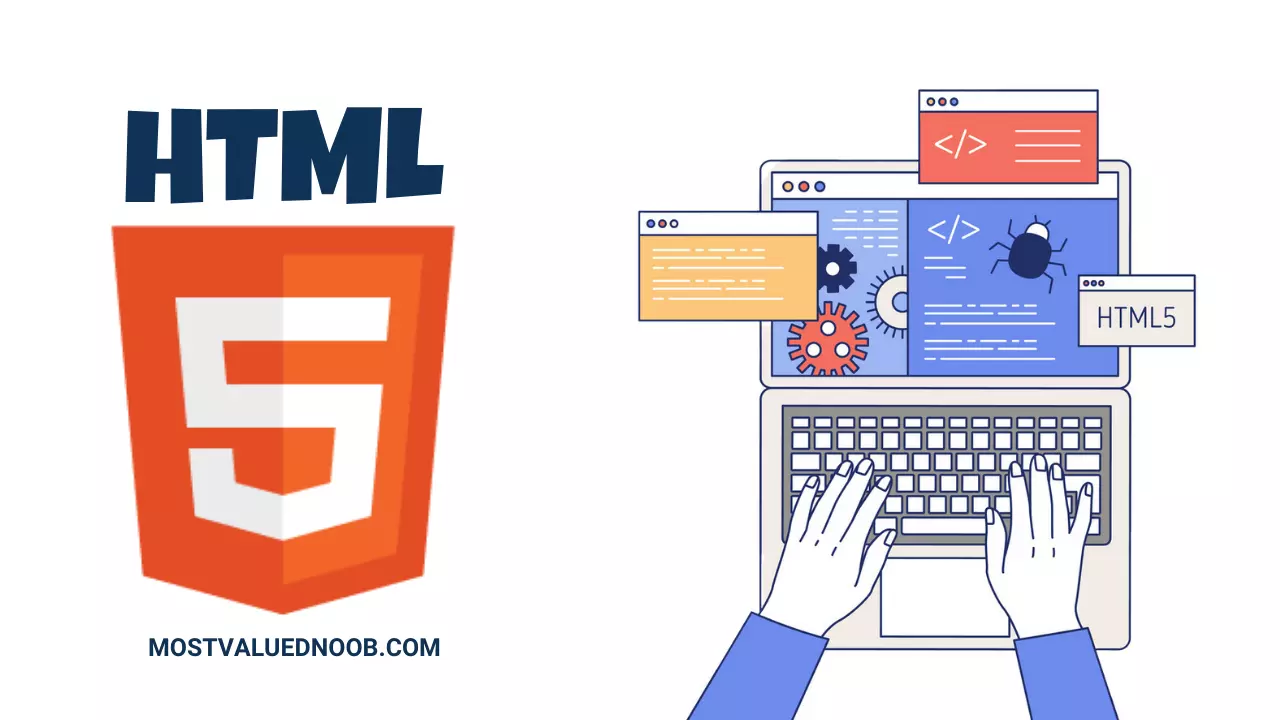
The language also rates well in the flexibility category since it no longer requires plugins to do a specific activity; instead, HTML5 contains rich media components that make your life easier and keep you away from plugin tags.
Games built using this language: HexGL, CrossCode, Bejeweled, etc.
3. JavaScript
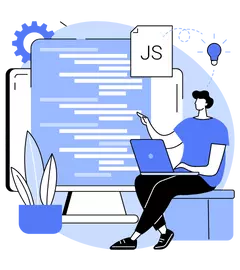
Being easily embedded with HTML, JS (short for JavaScript) is an easy-to-learn language made especially for people with almost zero to no programming background, making it very beginner-friendly.
This language is generally recognized as one of the core technologies of web development, with a large welcoming community that helps new coders. Furthermore, JavaScript is a prototyping-based, just-in-time compiled programming language that does not require the use of a compiler to run.
Java and JavaScript are two separate languages, so don’t mix them up.
Games built using this language: CrossCode, Tower Building, Mimstris JS Game, etc.
4. C
The primary programming language that makes learning other computer languages much simpler, C is the most commonly used programming language that is used to construct software, operating systems, and so on while also allowing you to comprehend computer architecture from the inside out.
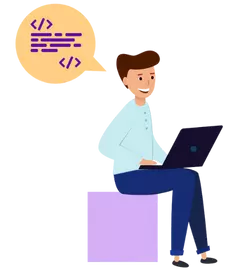
It is quicker than languages like Python and Java and uses procedural execution (step-by-step) while obeying portability more effectively than other languages since it requires slight modifications when moving from one environment to another.
This programming language is frequently used to create games for mobile operating systems such as Android or iOS.
C++ is an advanced form of C and both languages are widely used in system programming. C++ game development is hugely popular too.
Games built using this language: Quake II, Assassins Creed II, and III, etc
5. Java
Java is a free and open-source programming language that runs on a variety of platforms, including Windows and Mac. It provides reusability, allowing for cheaper development costs while generating a variety of agnostic code that is readily debugged, making it one of the world’s most used languages today.
It’s utilized for mobile and desktop applications, as well as game development and web and application servers.

Games built using this language: Minecraft, FIFA 11, Zuma’s Revenge, etc.
Things to know before Game Development:
Scope:
Many individuals begin making a game by selecting a random game engine and dreaming of creating a game similar to one they already enjoy. This is completely absurd even to consider because the games you play need a large amount of staffing and months, if not years, of design and construction. So, what makes you believe you’ll be able to pull off such a feat on your first try?
- Your initial game’s objective should be to create something that you can play, even if it’s in the most primitive form. It is a learning exercise, and it is only the first step, so don’t be startled.
- Having a huge objective for your development process may leave you wondering, “Where to begin?” because there will be so much to achieve there as well, all alone, making you feel as if you are barely advancing at all.
You’ll be able to do it better and faster the next time.
Specific Idea for the Game:
DON’T GO INTO YOUR FIRST GAME WITH A SPECIFIC IDEA!! Consider and examine your capabilities, then create your game around them. You don’t have to go for a big concept and ponder about it for days. Instead, just watch a few tutorials, get assistance from those who have prior knowledge in such an area, and then construct something that you are certain you will be able to manage. It’s OK to have a few pieces of your concept that you’re not sure how to go with, which is where Youtube tutorials come in handy.
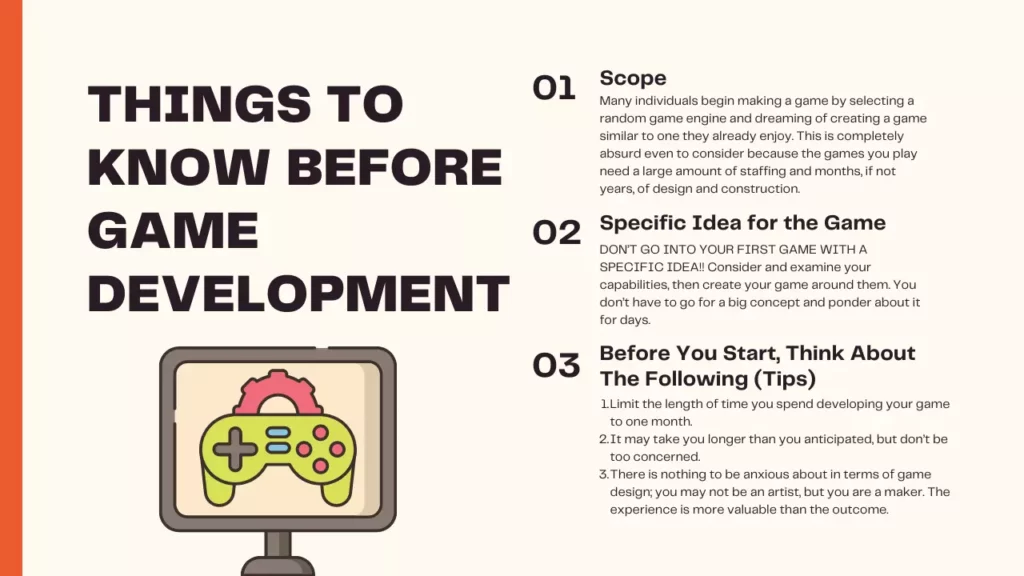
Start small. Keep it simple.
Designing a game that revolves around your abilities is the most brilliant move you could pull off. Recognizing your scope entails understanding your resources, and in this situation, you are your own resource.
Before You Start Game Development, Think About The Following (Tips):
- Limit the length of time you spend developing your game to one month.
- It may take you longer than you anticipated, but don’t be too concerned.
- There is nothing to be anxious about in terms of game design; you may not be an artist, but you are a maker. The experience is more valuable than the outcome.
- Set Milestones.
- Plan sub-Milestones. Break down larger jobs that are taking you too long into smaller tasks.
- Keep track of accomplished jobs during production, so you don’t get lost.
- While constructing your game, assess your game and its development every week.
- Don’t worry too much about production values.
- If something requires your attention for more than an hour, take a step back, rethink and ask for help. Use online resources.
- Request that others play and review your game. You’ll learn a lot from this, and you should write down all the insights you get from experience and include any reviewers’ ideas that come up and you think must be added to your game.
These suggestions will assist you in producing your own game in no time, wishing you luck!
Abdullah Tariq, the founder of this site, is a passionate gamer and loves sharing his knowledge about gaming hardware and accessories. He is also a software engineer whose ultimate goal is to develop gripping titles.
